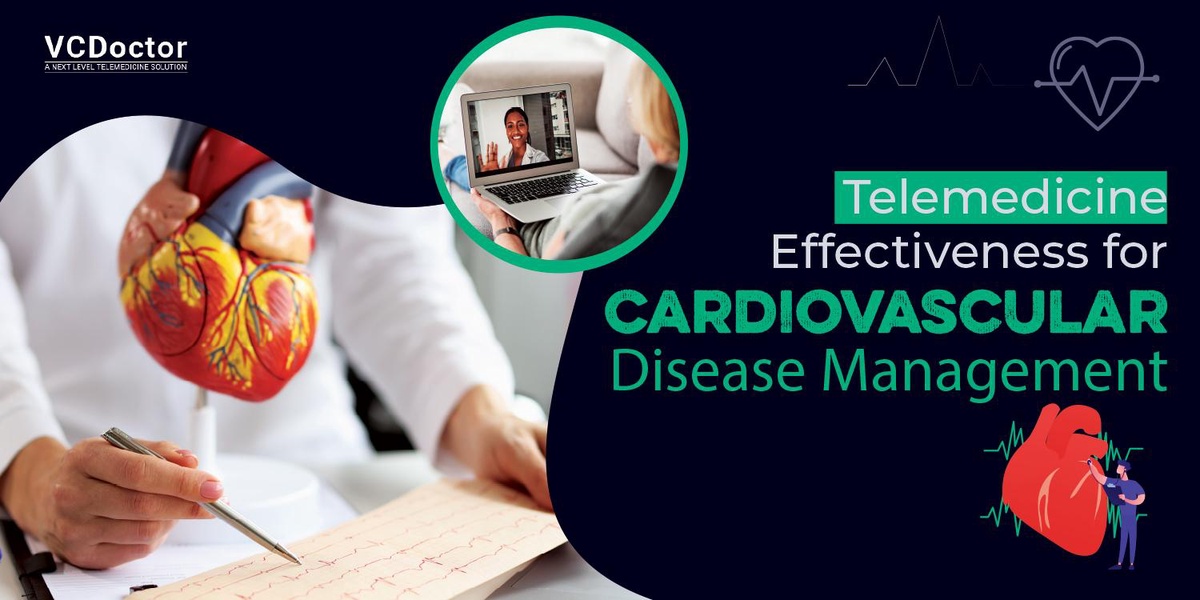cardiovascular disease management disease is the leading cause of death in the United States, accounting for approximately 1.5 million deaths yearly. It is also the leading cause of disability, accounting for 675,000 Americans who can’t work or play like they used to.
Telemedicine systems use technology such as video conferencing and medical equipment like blood pressure cuffs and heart rate monitors to deliver healthcare services remotely, improving access and care delivery while reducing costs.
The heart disease management mentioned in this blog covers heart attack detection using telemedicine systems, telemedicine advantages, and risk assessment for heart disease.
What is cardiovascular disease?
Cardiovascular disease (CVD) is a complex disease that can impact any part of the heart or blood vessel.
It refers to different types of heart diseases, like coronary heart disease, cardiovascular system disorders, heart attack, peripheral artery disease, and heart failure.
CVDs can be prevented or managed through lifestyle changes, medications, and surgery. Another factor that can influence CVD risk is high blood pressure.
High blood pressure means your blood pressure is higher than the normal range, and your risk of heart disease increases.
However, high blood pressure cannot be avoided altogether. Therefore, lifestyle changes like quitting smoking, eating healthy foods, and getting regular physical activity can help lower blood pressure levels.
What are the symptoms of cardiovascular disease?
Chest pain is the most common sign of cardiovascular disease. It can be caused by atherosclerosis or coronary artery disease.
Chest pain may also be associated with angina pectoris, a complication of heart disease in which chest pain occurs regularly and is accompanied by high blood pressure and pain in the heart muscle.
Shortness of breath is another symptom of cardiovascular disease. It can be caused by chronic obstructive pulmonary disease or congestive heart failure.
Other symptoms include fatigue, nausea, and vomiting. Finally, angina pectoris is a symptom of a heart attack that occurs when coronary arteries become blocked due to atherosclerosis or coronary artery disease.
This causes chest pain that can lead to death if treated quickly.
Telemedicine effectively treats cardiovascular signs of cardiovascular disease patients with hypertension, high cholesterol levels, diabetes mellitus, obesity, smoking cessation, and diet modification programs.
- Diabetes: uncontrolled diabetes is a significant risk factor for cardiovascular disease. High blood pressure and obesity are also risk factors for cardiovascular disease. In addition, smoking, lack of exercise, and high blood sugar levels increase your risk of cardiovascular disease.
- High blood pressure: high blood pressure is a significant risk factor for cardiovascular disease. Hypertension can cause heart attack, stroke, or death from heart disease. Lifestyle changes like quitting smoking and reducing dietary cholesterol can help lower blood pressure levels.
- Obesity: obesity increases your risk of developing cardiovascular disease by raising your risk of hypertension, high cholesterol levels, and diabetes. Obesity also raises your risk of joint pain and arthritis, which may lead to heart failure or death from cardiovascular disease treatment
- Smoking cessation: smokers who quit smoking typically have a lower incidence of heart attack, stroke, angina, heart failure, and death from cardiovascular disease.
- Diet: diet can also affect your risk of developing cardiovascular system disorders. High blood pressure is most common in people with high blood sugar levels, low HDL cholesterol (the “good” cholesterol), and a sedentary lifestyle.
- Lack of exercise: A sedentary lifestyle increases your risk of developing cardiovascular disease. Avoid smoking, lose weight if overweight, and exercise regularly to reduce your risk of cardiovascular disease.
- High cholesterol: High cholesterol is a risk factor for cardiovascular disease. The higher your blood cholesterol level, the greater your risk of heart disease.


No comments yet